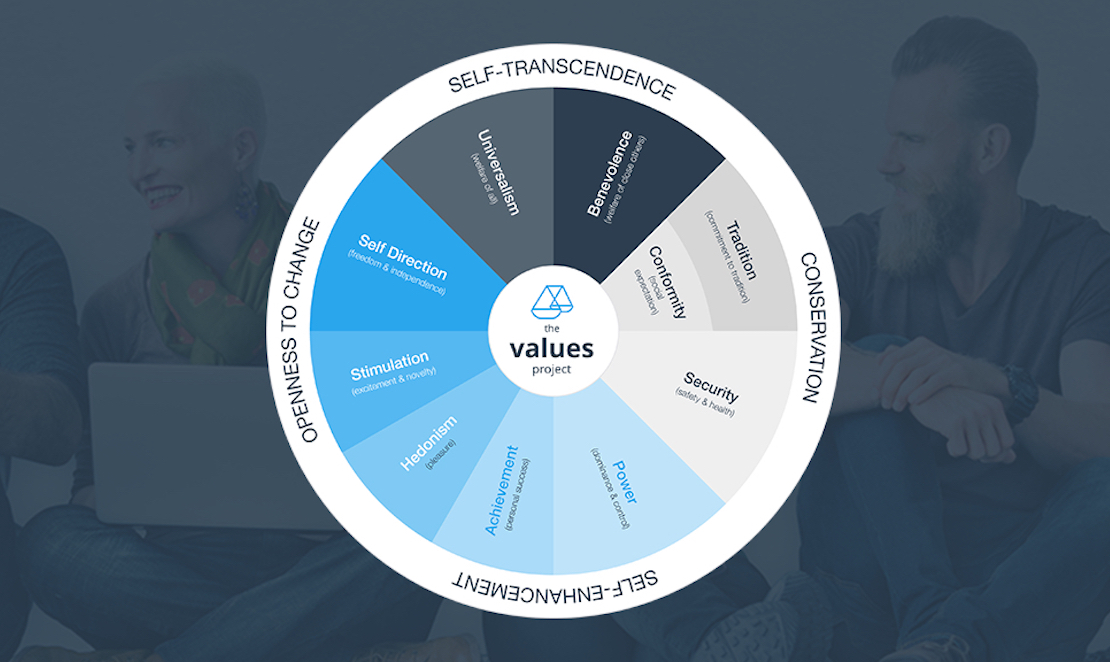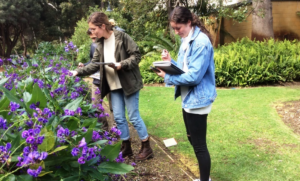UWA Professor Julie Lee tells me that, if I understand my values, it will help me make better decisions.
She says it can improve my relationships with others—from colleagues to loved ones and even children—and give me the words to encourage others to act in the way I want.
In short, it will make me happier.
“Life can be more satisfying when we understand our own values and that people can have different values.”
Julie, who heads UWA’s newly established Centre for Human and Cultural Values, has designed an online survey with her colleagues that reveals a clear picture of a person’s values in just 7 minutes.
The test promises to help discover what factors influence your everyday choices and make important decisions simpler.
It’s a big call. Can a 7-minute survey really make you happier?
KNOWING YOUR VALUES
Reading this article and want to take the values survey? Do it now, we’ll wait.
…
Results in? OK, read on!
If your values were clustered together in one area of the values circle, that’s because values next to each other in the circle are similar. They share the same motivational goals.
Values on opposite sides of the circle have conflicting motivations.

For example, people who score high on benevolence are motivated to put the welfare of their family and friends above all else.
They place a great importance on being helpful, loyal and honest in all aspects of their life.
On the opposite side of the values circle are people who aspire to do great things.
They place great importance on being ambitious, successful and influential, and to do this, they need to be better than others.
Julie has been working with a panel of 7500 people through an ARC Linkage grant with market research company Pureprofile.
She says benevolence is by far the most important value to individuals and power is the least important, on average.

On average, benevolence is the most important value to individuals.
But people differ greatly on which value is most important to them personally, with all values having at least some people who see that value as the most important, Julie says.
She says, in society, we need people with all the different types of values.
WHAT YOUR VALUES MEAN FOR YOUR DECISIONS
Julie says it’s important to understand our values because they only become conscious when they’re challenged.
For instance, imagine you’re offered a job that pays $130,000 a year but is high stress or one that pays $80,000 a year but is family-friendly.
Which do you choose?
“If you are influenced by other people and their values—say you have a partner who’s a bit more achievement-oriented—they might be influencing you to take the higher-paid job,” Julie says.
“It is important to know what’s important to you, because I think if you have a job that allows you to achieve your values, you could be so much happier.”
IN THE WORKPLACE
Our values guide not only our own actions but how we judge other people’s actions—and perhaps nowhere is this more obvious than in the office.
Julie recalls a job where she had co-workers who stayed until after 6pm every night and others who would leave to pick up their kids from school.
“We had some [achievement-oriented people], and they used to say, ‘I can’t believe people leave work early, they’re really not doing the right thing. They should commit more to the organisation’,” she says.
“And the [benevolence-oriented people] were saying, ‘Well they’re really not doing the right thing. They work long hours, but they should spend more time with their family. They should care more about their family’s welfare than about getting ahead at work.’

“There was this really strong judgement of people—and they were actually both working really hard.”
Julie says we find it easier to communicate with people who have the same values as us.
We’re also more likely to trust them because we can better predict what they’re going to do next.
But she says it could be a problem if everyone in an organisation has the same values.
Instead, Julie says managers can try to bridge the gap between, say, a typically conservative accountant—who places a high importance on conformity—and a typically dynamic marketer—who seeks new and exciting ideas and experiences—by including someone whose values lie between these two opposing positions on the wheel.
WITH LOVED ONES
Julie suggests not only taking the survey yourself but encouraging those close to you to do the same.
If you find that your partner, for instance, has opposing values, it might help you to understand them better.
And while there is an element of our values that are heritable—somewhere around 40%—Julie says she often sees siblings with very different values.
“When I think about siblings, they may grow up in the same home, but they have very different experiences,” she says.
About 40% of our values are inherited, but siblings can often have very different values.

“They may even experience the same events quite differently, and that can change the things that are important to us.”
Once you know a person’s values, you can frame things in a way that will appeal to them.
Julie says people can perform the same behaviour for very different reasons.
You might encourage someone who values hedonism to come out to dinner because it will be fun rather than because it’s an opportunity to discuss a family matter.
“Just a few differences in the way you say things can change the outcome,” Julie says.
CHILDREN’S VALUES
Julie says the research team discovered the values circle exists in children as young as 5 years old.
“Their values look very much like adult values, and they relate to their behaviour, even at a really young age,” she says.
“People didn’t think that that was the case.
“They thought that values didn’t establish themselves until at least teenagehood, and it wasn’t until adulthood that they were stable.”

The values circle exists in children as young as 5 years old.
Julie says children start becoming much more aware of other people around 8 years old, and many drift towards benevolence and conformity on the values circle.
“Then when they start hitting the hormonal years, just before they go to high school, we see stimulation—and for some achievement—increasing in importance,” she says.
HOW OUR VALUES CHANGE
Adults, too, can see dramatic changes in their values over time.
“In some of the work we did on adults, we measured values 2 years apart,” Julie says.
“We found that, for people who had experienced a lot of major life events, their value priorities were really different.
“For people who had experienced no major life events, their values were almost the same as 2 years earlier.”
So you may have to take the survey again in a couple of years. But for a little bit more happiness, I think it’s 7 minutes worth sparing.








